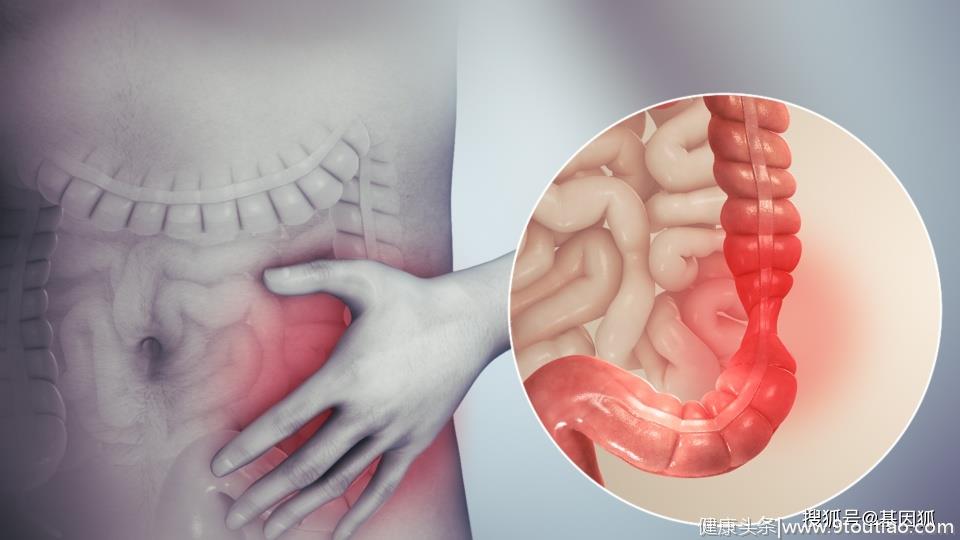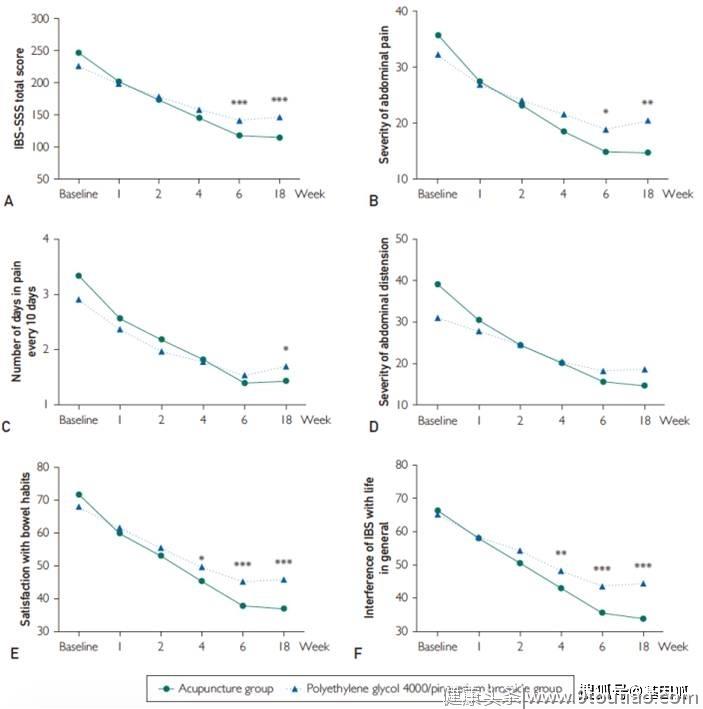经常性拉肚子?最新研究发现针灸可以有效缓解!
肠易激综合征(irritable bowel syndrome, IBS)是临床常见的一组以腹痛、腹胀、腹部不适伴排便习惯改变为主要症状的临床综合征。遗传因素、精神心理异常、肠道感染、黏膜免疫和炎性反应、脑-肠轴功能紊乱、胃肠道动力异常、内脏高敏感、食物不耐受和肠道菌群紊乱等多种因素参与IBS发病。IBS严重影响患者的工作及生活质量,临床治疗多以对症治疗为主,尚缺乏理想的药物疗法。

IBS是针灸的优势病种之一。2020年6月1日,美国著名临床医学杂志Mayo Clinic Proceedings(影响因子7.091;一区杂志)在线发表了南京中医药大学附属医院孙建华教授团队的最新研究成果“Effect of Acupuncture in Patients with Irritable Bowel Syndrome: A Randomized Controlled Trial”。附属医院裴丽霞副主任、耿昊副主任、郭静博士研究生为共同第一作者,孙建华教授、沈洪教授为共同通讯作者。
然而,现有临床试验存在样本量小、随机方案不规范、缺乏分配隐藏等方法学局限性。据此,课题组牵头组织了“针刺治疗IBS多中心随机对照试验”,联合7家医院共同完成。于2015年启动,历时三年完成,共纳入531例IBS患者,按照便秘或腹泻分型进行分层,各层按照2:1随机分为针刺组和药物组,分别接受6周的针刺治疗和药物治疗,随访12周。在治疗6周结束时,针刺可以显著降低患者IBS症状严重程度积分123.51(95%,116.61-130.42),治疗应答率为79%(272/344),提高IBS生活质量评分13.35(95%,11.67-15.02)。12周随访结束时,针刺显示出显著的长期疗效。研究中并未出现严重不良事件,具有较好的安全性。
 Fig 1 IBS-SSS 总分及分量表评分随时间变化图
Fig 1 IBS-SSS 总分及分量表评分随时间变化图项目组基于针灸治疗IBS的临床有效性进而开展基础研究,分别从针灸通过调节脑-肠轴、缓解内脏高敏感、改善肠道动力、修复肠上皮细胞屏障损伤、调节肠道菌群稳态、调节免疫平衡等多个方面对针灸治疗IBS的效应机制进行了系列研究。其部分研究结果发表在《The American Journal of Chinese Medicine》、《BMC Complementary and Alternative Medicine》、《Evidence-Based Complementary and Alternative Medicine》等国际医学期刊上。
本研究为针灸治疗IBS提供了高质量证据,为制定针灸治疗IBS指南和专家共识提供依据,为优化针刺临床治疗提供了可借鉴的诊疗思路。该研究获得江苏省中医消化病临床医学中心项目、江苏省中医领军人才项目、江苏省中医院高峰人才项目的资助。(来源南京中医药大学)
AbstractObjective
To evaluate the effect and safety of acupuncture for the treatment of irritable bowel syndrome (IBS) through comparisons with those of polyethylene glycol (PEG) 4000 and pinaverium bromide.
Patients and Methods
This multicenter randomized controlled trial was conducted at 7 hospitals in China and enrolled participants who met the Rome III diagnostic criteria for IBS between May 3, 2015, and June 29, 2018. Participants were first stratified into constipation-predominant or diarrhea-predominant IBS group. Participants in each group were randomly assigned in a 2:1 ratio to receive acupuncture (18 sessions) or PEG 4000 (20 g/d, for IBS-C)/pinaverium bromide (150 mg/d, for IBS-D) over a 6-week period, followed by a 12-week follow-up. The primary outcome was change in total IBS-Symptom Severity Score from baseline to week 6.
Results
Of 531 patients with IBS who were randomized, 519 (344 in the acupuncture group and 175 in the PEG 4000/ pinaverium bromide group) were included in the full analysis set. From baseline to 6 weeks, the total IBS-Symptom Severity Score decreased by 123.51 (95% CI, 116.61 to 130.42) in the acupuncture group and 94.73 (95% CI, 85.03 to 104.43) in the PEG 4000/pinaverium bromide group. The between-group difference was 28.78 (95% CI, 16.84 to 40.72; P<.001). No participant experienced severe adverse effects.
Conclusion
Acupuncture may be more effective than PEG 4000 or pinaverium bromide for the treatment of IBS, with effects lasting up to 12 weeks.